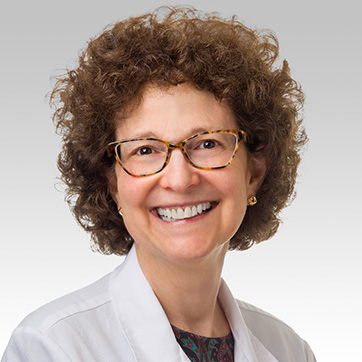Chair's Message

Our many multidisciplinary clinics... promote strong communication among specialists, better patient care, and optimal training of residents from teams of specialists who bring a perspective beyond that of a dermatologist.”
Chair, Department of Dermatology
Walter J. Hamlin Professor of Dermatology
On behalf of our faculty, residents, fellows and staff, I welcome you to the Department of Dermatology at Northwestern University Feinberg School of Medicine. The beginning of 2024 marks the 20th anniversary of my becoming Chair – and I am so excited about the continued trajectory of contributions we will achieve in the future.
Our department, originally established in 1896, is one of the oldest departments of dermatology in the country. Graduates of our dermatology residency program and research training programs have become academic and community leaders in dermatology and dermatological research locally, nationally and internationally.
Twenty years ago, we had a handful of dermatologists on faculty, a few scientists, and no community program. We now boast ~25 fulltime clinical faculty, more than a dozen scientists as primary faculty, and about 20 who are part of Northwestern Medicine in the community. We continue to expand in both clinical and research opportunities, which translates into outstanding care for our patients that offers cutting-edge interventions.
Northwestern prides itself on the unprecedented collaborations among faculty in both clinical and research pursuits. Our many multidisciplinary clinics, largely based in the dermatology space, promote strong communication among specialists, better patient care, and optimal training of residents from teams of specialists who bring a perspective beyond that of a dermatologist.
Dermatology is the base for the multidisciplinary Skin Cancer Institute of Northwestern Medicine with its distinct clinical and research programs on melanoma, CTCL, epithelial carcinomas/transplant service, oncodermatology (mucocutaneous side effects of cancer interventions and transplants) and skin cancer education. Our Inflammatory Skin Disorders program includes specialty clinics in psoriasis-psoriatic arthritis, connective tissue disorders, atopic dermatitis, contact dermatitis, and hidradenitis suppurativa. Our Women’s Skin Health program offers expertise ranging from vulvar disease to hair disorders to cosmetic issues to pregnancy concerns. Another example is our Center for Ethnic Skin and Hair, which offers cutting-edge services for pigmentation issues, keloids and other problems seen more often in individuals with skin of color. This last program, currently involving 5 fulltime faculty members, will expand in 2025 when we open the new community-based office in the Bronzeville area of Chicago.
Our department offers two residency programs — an outstanding three-year residency training program with the opportunity for a four-year (2+2) research track that combines residency and fellowship training (5 per year) and our combined Medicine-Dermatology five-year residency (one new resident per year). All ratings place our trainee program in the top 10 nationally. The McGaw Medical Center of Northwestern University provides a rich academic environment in which our residents gain clinical experience in diverse care environments, including Northwestern Memorial Hospital, the Ann & Robert H. Lurie Children’s Hospital of Chicago, and the Jesse Brown Veteran’s Administration Medical Center. Residents receive comprehensive exposure to all aspects of dermatology while working in the outpatient clinics and on the inpatient floors. The patient population and complexity of disorders seen are diverse. Our residents learn about general dermatology, pediatric dermatology, cutaneous and aesthetic surgery and dermatopathology from faculty who are leaders in their fields. Our goal is to nurture the career development of our residents through innovative and individualized programs to extend skills teaching, research and more specialized areas of practice.
Our bench and clinical research programs are internationally recognized. Ranked 3rd again this year in NIH funding, Northwestern has one of a handful of NIAMS-funded Skin Biology & Diseases Resourced-Based Centers (SBDRC) with 70 scientists from 16 Northwestern departments conducting research as SBDRC members. Scientists focus on keratinocyte biology, nanotechnology, sensor research, genomics and epigenomics, cutaneous inflammation and immunology, wound healing, the biology of carcinomas and melanomas and epithelial stem cells. Two areas of focus of our SBDRC are bringing together clinicians and scientists to collaborate toward translational research (facilitated by our cores) and our Minority and Sex Awareness program, highlighting biologic differences within specific patient populations. Our T32 funding from NIAMS supports the career development of physician-scientists, leveraging the outstanding scientific community, which continues to grow rapidly with the opening this year of the new Simpson Querrey Biomedical Research Center on campus. Our Dermatology Clinical Research Unit is one of the largest in the country, with a staff of 30 dedicated personnel. The Unit provides infrastructure support for more than 200 IRB-approved projects spanning a wide variety of research directions, particularly related to inflammatory skin responses and skin tumors. While our team conducts many clinical trials to bring cutting-edge drugs to patients, we also run numerous investigator-initiated studies that are initiated by our faculty and trainees to take discoveries from the lab to the clinic or better understand the diseases we treat.
Thank you for visiting our website and learning about the breadth and depth of expertise that our department offers. If you have further questions, please feel free to contact us.